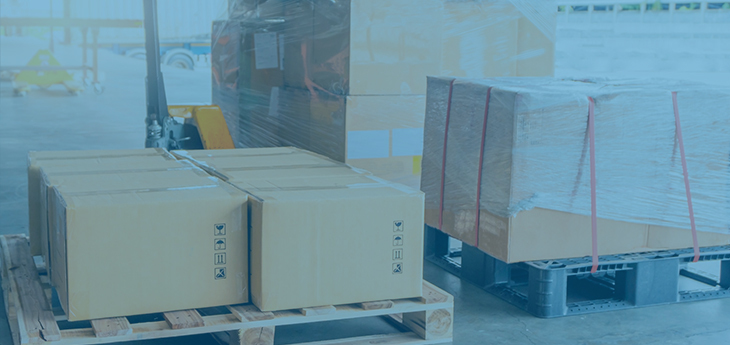What Does Freight Shipping Mean for Small and Big Businesses?

What Can You Expect During Freight Shipping as a Small Business vs. What Big Company Experiences
Whether you run a small business shipping a few pallets from time to time, or a large company regularly moving thousands of units, what you don’t know about freight shipping is bound to cost you both time and money.
Freight shipping can vary significantly depending on the size of your business.
That’s why we’re breaking down the key differences in shipping for small businesses versus large enterprises, from logistical challenges to shipping options like LTL, FTL, intermodal, and more…
Freight Shipping for Small Businesses
Small businesses face very different challenges from large companies. With smaller shipments and fewer resources to move them, finding cost-effective and efficient options is often one of the main hurdles to overcome.
Small businesses often rely on less than truckload shipping. LTL allows multiple shippers to share the cost of a single truck, which is a much better option than renting an entire truck when you don’t have enough goods to fill it. You save money by paying only for the portion of the truck your freight occupies.
Pros of LTL Shipping for Small Businesses
LTL shipping is the most cost-effective way to transport your cargo if you are shipping several pallets (generally 1-4 is the most cost-efficient). On top of that, depending on your requirements, scheduling an FTL shipment can take a few days (except when shipping with Freightera), and depending on the cargo you’re transporting, it can sometimes require special licenses and paperwork if you’re shipping oversized or heavy cargo. LTL allows you to schedule a shipment for pickup tomorrow, or in some cases, even for the same day. The shipment gets picked up and on its way before you’ve even had time to finish your shift.
Booking LTL can be more complex than FTL shipping. With LTL, you need a quote number, specific labels, and tags to ensure your shipment isn’t misplaced — much like sharing a space with 20 to 40 roommates! Each item needs its own identifier (label) to keep everything organized. On the other hand, FTL is like renting the entire apartment for yourself — everything’s more straightforward because it’s just your shipment, from start to finish.
Luckily, with today’s innovative business freight marketplaces like Freightera, you can get online freight quotes in seconds and book freight without even talking to a shipping expert or a broker. The carriers are often partnered up and you can book your cargo from one end of Canada to the other end of the USA in just a few clicks. Twenty years ago this was unimaginable. Everything is handled for you, safely and efficiently which leaves you plenty of time to worry about managing your own business. You can check out Freightera and sign-up for free any time you are ready to up your game.
Cons of LTL Shipping
Since with LTL shipping, several shippers need to share a single truck, transit times may be longer. This is because everyone is shipping to different places, so the cargo needs to be redistributed at carrier terminals for further shipping. The redistribution and more frequent loading and unloading mean that with LTL, there’s a higher risk of cargo damage. Although rare, damage is certainly a concern that’s more prevalent in LTL than in other forms of transportation. And with concealed damage claims slowly going the way of the dodo, it’s essential to be prepared.
Lastly, if you’re a small business owner, you likely don’t ship often and you don’t ship a lot. This means that you don’t have the volume of cargo for carriers to take you very seriously which, unfortunately, means that you have limited bargaining power when it comes to shipping rates. Carriers don’t like dealing with small shippers directly for various reasons, so they may increase rates to make it worth their while, or they may refuse service altogether.
Luckily, LTL shipping is Freightera’s bread and butter, we have the buying power with carriers, and we’re here to help get you the best possible LTL rates, and the best possible service. You don’t need to hire a dispatcher, logistics specialist and train your invoice specialist to handle the difficulties of freight shipping when you can get all of that and more by simply booking with Freightera!
Cost Considerations
Keeping shipping costs down is critical to maintaining profit margins. Shipping solutions like LTL are cost-effective, but smaller companies often struggle with additional fees that can pile up, including unfair ones such as unrequested tailgate fees, reclassifications, etc. Freightera’s Rate Defense™ program is designed to protect you from those unpleasant surprises. You can learn more about Freightera’s Rate Defence™ here. Understanding these potential charges and planning shipments carefully can help small businesses to avoid extra costs.
Freight Shipping for Large Shippers
For large businesses or frequent shippers, freight shipping is more about optimum efficiency, minimal costs, and managing large volumes of goods in a timely fashion. Large companies typically have more leverage and resources, which allows them to even have their own dedicated logistics teams to handle operations. Large businesses often rely on FTL shipping, which is ideal for companies that have enough goods to fill an entire truck regularly. FTL is typically faster and involves less handling since the freight stays in one truck from pickup to delivery. That means smaller chances of damage occurring too.
Pros of FTL Shipping for Large Businesses
Because the truck is dedicated to one shipment, FTL shipments are faster with fewer stops and much less handling. Not only does this mean increased speed of delivery, but as mentioned earlier, much lower chances of damage. And to top it off, companies that can afford FTL shipments can often negotiate better rates. Flat rates are very common with companies that use one dedicated carrier for all of their shipments.
Cons of FTL Shipping
Flat rates mean stability, but they can also mean unnecessarily high rates for some, or all shipments. FTL itself is already expensive, but businesses that need convenience can be overpaying for a long time before re-negotiating.
Managing an entire fleet of trucks or large-scale FTL shipments requires complex infrastructure. For companies that own their own fleets, this means running terminals, negotiating fuel prices, running repair shops, etc. For newer electric trucks, this means charging stations, trained personnel, and more. Companies that don’t own fleets of their own need to negotiate prices with carriers or brokers who have experience and infrastructure themselves.
Logistical Challenges for Large Businesses
Large businesses may have more resources at their disposal, but they also face significant logistical challenges. They have to manage a high volume of shipments across various locations, which complicates route, time, and price optimization.
They face unique challenges with inventory management. A small business can be heavily inconvenienced by a delay, but on a larger scale, border delays, road closures, or strikes can have more significant consequences for large businesses.
Lastly, while large businesses have the advantage of negotiating directly with carriers, maintaining these relationships can become complex and tiresome. When prices or service quality (unavoidably) fluctuate, it can become difficult to find a new service provider in a reasonable time frame.
Many large companies use modern and sophisticated software, or they hire dedicated freight specialist teams to streamline their operations. Some companies also leverage dynamic pricing systems, where shipping rates adjust based on market conditions, which provides better flexibility for competitive rates. Some of Freightera’s carriers offer such rates which allows us to offer diverse rate options and to provide even more competitive rates off-season or when carriers get excess capacity.
Cost Management for Large Businesses
Because of their high shipping volumes, large businesses often have more leverage when it comes to negotiating shipping rates. Many opt for long-term contracts with carriers, to guarantee good rates over time. Additionally, larger businesses can spread the cost of shipping across multiple shipments, which allows them to take advantage of economies of scale.
However, even with their larger budgets, shipping costs are still a major concern. Freight transportation costs can fluctuate wildly based on fuel prices, demand, and capacity, even without dynamic pricing. That’s why many large shippers turn to freight specialists, data analytics, and logistics software for cost and time optimization.
Conclusion
Optimized freight shipping is crucial for the success of both small and large businesses, but the experiences of the two differ greatly based on their size and their unique shipping needs.
For small businesses, LTL shipping offers a cost-effective solution, but they often face logistical challenges, such as limited bargaining power and fewer carrier options.
For large businesses, FTL shipping provides greater control, faster deliveries, and lower risk of damage, but managing high volumes of freight, inventory, and multiple carrier relationships requires teams of specialists, time, money, and sometimes additional infrastructure.
Regardless of the size, both small and large companies must navigate the complexities of freight shipping, which is why Freightera exists. We offer specialized services for large and small businesses alike. We offer unmatched FTL and LTL rates for several modes of transportation, including road, rail, as well as intermodal. Our innovative software platform, combined with our excellent relationships with carriers and unmatched Client Care team allows us to provide the best prices and the best customer service in the industry. Of course, don’t just take our word for it, see what our customers say in the hundreds of 5-star reviews they kindly provided.
Ready to ship? Register for a free account and check our rates before shipping your next load. See how much you could save with us and how easy it is to find the best current shipping prices.
Still have questions? Need help? Feel free to reach out to us via Online Chat, by email at [email protected], or by phone at (800) 886 4870, ext 1.
